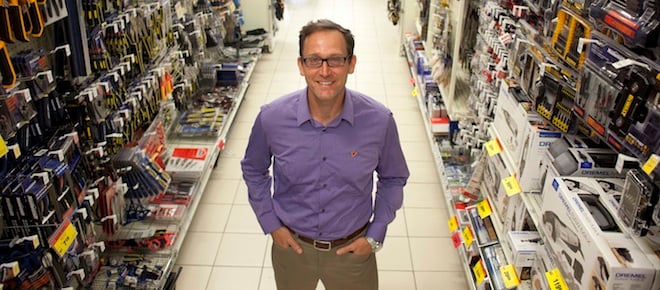How corporate social responsibility improved these companies’ bottom lines
Doing good turned out to be good for Canadian Tire, Ford and Gap too
TORONTO, ON – JUNE 11TH, 2012 – Tyler Elm, Vice President of Corporate Strategy and Business Sustainability at Canadian Tire, sees sustainability as a business strategy that aligns benefits to its customers, its businesses and the environment. Canadian Tire is one of the first companies to integrate business sustainability objectives into its overall operating plans and quarterly reporting.
Share
Home | Article | List | Video | Methodology | Industry | More from Sustainalytics

In 2008, Tyler Elm had a job interview with Canadian Tire. He brought with him a vision: there’s money to be made in environmental sustainability. He just had to convince the bigwigs.
“Why should we care?” they asked. Elm responded by pulling a socket set from a nearby shelf. He pointed out its excessive packaging and told them they were wasting paper and plastic—and money. A smaller package not only reduces waste, Elm said, but also unit size. That means more products per shipping container. And that translates to lower shipping costs.
He got the job. Four years later, Elm is Canadian Tire’s vice president of corporate strategy and business sustainability. “Sustainability is strategy,” he says. “We’ve tailored that concept to our for-profit mandate.”
His idea to cut down the socket set packaging led to a 15 per cent cost reduction in the shipment of that product. Later, his team discovered that changing the positioning of overhead lights could reduce energy use by up to 25 per cent. And the addition of a white roof—reflecting light and retaining less heat than dark shingles—on a new Canadian Tire store in Bowmanville, Ont., has led to savings on air conditioning costs in the summer (indeed, the company believes that the outlet is the most energy efficient retail store on the continent). By improving the company’s environmental record, Elm found money to be made: a win-win.
Canadian Tire is just one example of companies both large and small that have rallied under the banner of corporate social responsibility (CSR)—the notion that business should have a moral conscience on social issues, and a concern for the needs of future generations when it comes to the environment. Sometimes it’s about winning over customers, especially in an era when word of corporate malfeasance can spread like a flu pandemic, and increasingly savvy consumers are willing to switch from brands that don’t reflect their values. But like Canadian Tire did, companies are also finding opportunities to improve the bottom line—and that may be the most important part.
Take Ford Motor Company. The Detroit-based automaker, once famous for its heavy-duty, gas-guzzling, “built Ford tough” pickup trucks, may not be the first company that springs to mind when it comes to sustainability. But these days, more and more consumers are coming to associate Ford with their line of fuel-efficient motors, the EcoBoost-branded engines, or even the all-electric Focus.
Stephanie Janczak, Ford’s manager of electric vehicle infrastructure and policy, says the company started looking into designing hybrid and electric vehicles about a decade ago. The reason: consumers wanted them, and the company smelled dollars. Ford expects that as much as one-quarter of its global fleet of vehicles will be at least partially electric by 2020. “We let the consumer dictate which vehicle we’re going to produce,” Janczak says.
The question is: do people really want hybrids because they are green, or because they will save money on gas? To Ford, the answer may be irrelevant. The car giant—the only Big Three U.S. auto company that did not accept a government bailout after the 2008 recession—may not have been driven by an eco-agenda, but it didn’t hurt Ford to align with it. In fact, as one new study shows, it might be vital.
According to a soon-to-be released study by Tima Bansal, executive director of the Network for Business Sustainability at Western University’s Richard Ivey School of Business, CSR is significant to a company’s long-term survival. Bansal tracked the progress of 211 firms deemed socially and environmentally responsible in the early 1990s over the subsequent two decades. She compared their performance with that of an equal number of companies not identified as responsible. She found that businesses with sound CSR principles—equitable wages, displays of philanthropy, marked efforts to reduce carbon emissions—were more likely to survive that 20-year period. “I don’t think there’s one big company that hasn’t thought about CSR,” says Bansal.
“NGOs and other stakeholders that are on the ground are scrutinizing companies in a major way,” says Heather Lang, director of research products with Sustainalytics, Maclean’s research partner for the Top 50. She notes that consumers have also become more sophisticated in their purchasing choices, demanding safer, healthier and sustainable products. “Yet consumers could be going further in elevating social and environmental issues to companies.”
Consider what happened to the Gap. In 2004, the San Francisco-based clothing company found itself facing widespread consumer backlash after revelations came to light that its supplier factories in the developing world—India, primarily—were using child labour. Children as young as 10 were making Gap garments in Delhi’s back streets. Consumer anger grew to a boil, spurring boycotts, as the Gap scrambled to cut ties with suppliers and clean up its battered image.
To combat the problem, the Gap began issuing annual reports on the safety standards and working conditions of its suppliers—Ford and Canadian Tire also issue CSR reports (the latter does so every quarter). When consumers feel they’ve been duped, the damage can run deep. “That’s where companies are most concerned, especially with today’s social media, because it can get beyond their ability to control the messaging,” says Bansal. “People can perceive them as not doing the right thing, which is very costly.”
In the end, as many companies on this year’s Top 50 socially responsible corporations list have found out, well-communicated and considered CSR initiatives are more than social responsibility. It’s sound business.
